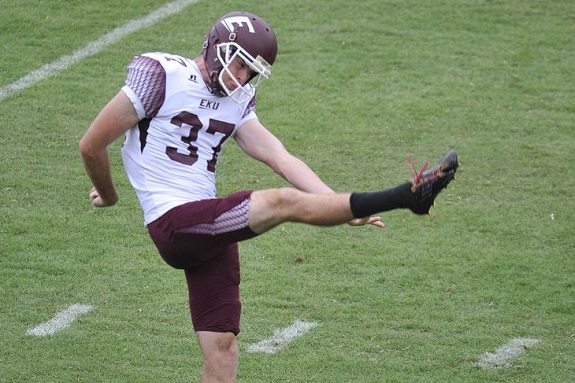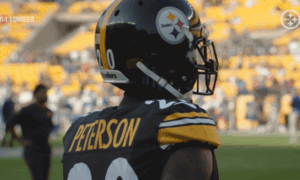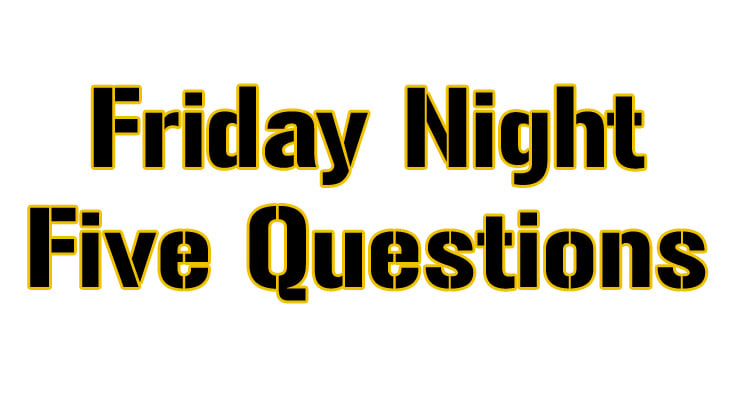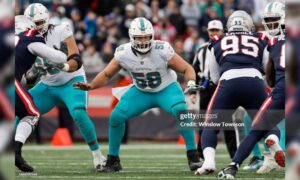Was fortunate again to be joined by another Pittsburgh Steeler for an interview with Jordan Berry taking time out of his schedule to talk to me yesterday. Love talking to all the players I have but was particularly excited to talk to him considering his background that I profiled several weeks ago.
Q: You’re currently working at a Kansas camp through Prokicker. How did you get involved out there and what are you doing?
A: I’ve known the guy who has run the camp since high school. Just having the time off and not really doing much so thought it’d probably be best to go out and kick with some people. I got in contact with the guy who runs it and asked him if he minded if I tagged along for a little bit. Rich Camarillo, who is one of the best punters ever, he was up in Colorado with us punting. So I thought it’d be a good idea to go up and work with him. And we’re helping out with some of the high school kids as well.
Q: What was the earliest you remember playing American football while in Australia?
A: It was at the end of my senior year in high school when I started playing organized games. I think it started in November, I had to wait for the Australian Football and the rugby season to finish. That was my first organized game. In terms of punting with an American ball, I started doing that probably tenth grade, when I first started really looking at it. My dad had a few balls laying around to use. Really didn’t start doing that until my second year of high school.
Q: In what ways did ProKick Australia help you become prepared for the NFL?
A: Initially they were the ones who helped me get over here to college as well as Alex Dunnachie and Tom Duyndam. I’ve been working with them since high school. It’s been really good stuff, it helped me out through that whole transition. Going through the college process, learning what’s going to happen in a more organized setting in American football.
Then last year when I went back for the eight months, I was able to train with him along with John Smith, the other guy who works at ProKick Australia. Just spending that time with him, learning all the ins-and-outs of punting has been really beneficial. It’s nothing really too crazy, just working on the technique. I can hit a good ball but hitting the bad ball is what I’ve really improved on.
Q: You were signed in April. A lot of fans are interested in process. How did Pittsburgh happen, who did you hear from, did you work out prior, etc.
A: Coming over this year, I switched agents so I returned back to America in March. With the new agency wanting to work with me, they were sort of putting their reputation on the line. One of the guys who works in that group in Steve Ortmayer, a long-time NFL coach. He was Ray Guy’s special teams coach for awhile when he was over there with the Raiders. So I met up with him, he was just up the road from where I was staying at. Went and kicked with him a few times. He put my name forward. Through another contact that agency group is Dermontti Dawson, who played a longtime up here with the Steelers so he’s got quite a few contacts there. Through him we were able to organize a tryout at Heinz Field. Got signed that day which was pretty fortunate. And then yeah, went into the rookie minicamp and the summer training.
Q: You had a recent interview with Mark Kaboly and you told him you were working at McDonalds before signing with the Steelers. Was there a time where you had some internal doubts about a pro career?
A: Definitely. When I finished up in college, I really got no tryouts or no real opportunities at all coming out my senior year. I had quite a few doubts at that stage. I still felt like I had the ability at least to be able to compete at that level. So I stayed confident with it. I went back home, finding any odd job you could for that eight months just to get as much money as possible so I could come back over here and have the best opportunity I could. Working at McDonalds obviously wasn’t ideal but it paid the bills and helped me get back over here.
Q: By my count, you were involved in at least eight fakes in your college career, throwing, running, and receiving. What was it about the school that made them so open and how much did you love getting to run them?
A: It was through all the coaches there. My first year we had Dane Damron, who was our special teams coach. He ended up moving up to offensive coordinator and then our head coach Dean Hood took over special teams for the rest of my time there. Both of them had the idea that if we could have our punt team set up simple for us but for other teams looking at it, they’re going to have to wait. As well as if we kept working at it, we might be able to get that first down. Not just myself but the other guys on the punt team, running or throwing, were able to convert a first down about every week.
So with that effort, the coaches were really happy with the way we were running it. It was just building on it since my freshman year and by my senior year we had a pretty good team going. It’s pretty good fun, I really enjoyed it. When you get to throw a pass complete for a first down or run for a touchdown, all those sort of things that other guys don’t get the opportunity to do, it’s pretty good.
Q: You had a particularly notable fake, a “punt pass” against Morehead State. You even told the coaches you would rather punt it than throw it. I know you’ve been asked about it before but how did that play even come about and what were you thinking right before that play?
A: That play we actually got off of a guy by the name of John Murphy. He’s a long-time, well-known football coach within the Australian community. He gave me that idea back when I was in high school. So when I came over to the states, I gave that idea to Coach Hood and Coach Damron.
At first, they weren’t too sure about it but with me never really having thrown a football before, my throw wasn’t very pretty. That’s how you pass the ball in Australian football. Being able to see I could hit those targets, they were pretty confident about putting it into the playbook. While I was there, it was pretty much an automatic check where if they left the receiver uncovered we automatically run that play and hit them. It worked out well. It was pretty exciting.
Q: What was it like getting featured on Sportcenter for it?
A: Pretty cool to get that bit of exposure. It was really nice that a lot of people back in Australia got to see it.
Q: Given your background, have the Steelers talked to you about using you on a couple fakes?
A: Not yet. But like every team once the season comes around they’ll have something set up for in-game. But it’s really been working on the punting.
Q: For those who don’t know much, what are some of the main differences between a rugby style and traditional punt?
A: For the traditional, it’s really working on your placement and your hang time. With the rugby, especially the way we ran it in college, it’s going through your progressions. Sort of like a quarterback would. On about half of the rollout plays, we’ll have it where you read the receivers, make sure you go through progressions. It’s a little bit tricky with the ball being pointed and trying to punt the ball while you’re running at full speed. Just trying to keep the ball low so it can roll along the ground. It isn’t real pretty but it’s still nice for the net yardage which is all the coaches at the college level were after.
Q: Have you punted both styles in camp?
A: You gotta keep the NFL method because of the rule that you can’t have as many people run downfield prior to the punt. So it makes [the rugby style] a little bit more difficult.
Q: Last question. Your special teams coach is Danny Smith, who is as high-energy as they come. Give me a little about him, about his passion for his job.
A: You’re not really going to find many more people passionate about special teams more than he is. He’s really into it. He’s very knowledgeable with all his stuff. It’s really good to have someone like that in charge of you on special teams.
Love hearing the behind-the-scenes information Berry was full of. It’s funny that like in most jobs, who you know can be just as important as how good you are. Berry’s agency was able to use its ties to Dawson to get Berry a tryout, the same thing Mel Blount did for C.J. Goodwin.
Though his Australian background and fakes make his story unique, as I’ve mentioned before, and as Berry hints at, it’s all about being a successful, consistent punter who can get the proper hangtime and distance on his punts. Everything else is secondary.
But if you haven’t checked out the “punt pass” we talked about, I’ll link it below. Super cool.







